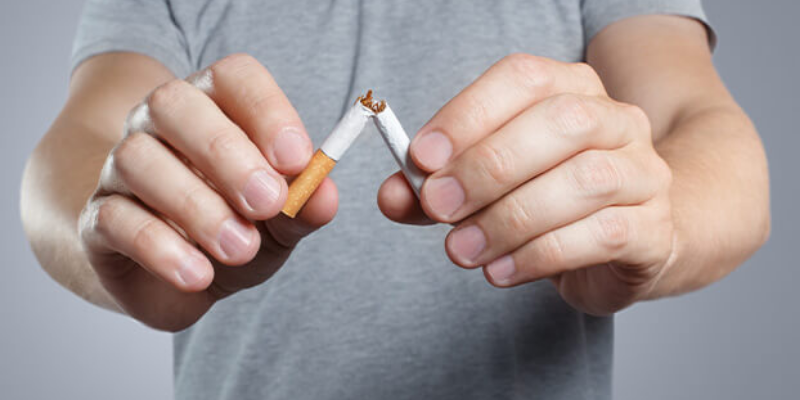How Long After Hair Transplant Can I Smoke?
Most of our patients who are thinking about getting a hair transplant have trouble with the idea that they shouldn’t smoke before and after the procedure. Not by chance, one of the most common questions they ask is how long after hair transplant can I smoke.
Even though people have known for a long time that smoking is bad for our health, recent studies have shown a link between nicotine use and slow wound healing and hair loss.
So, this article will briefly explain how smoking affects hair transplant surgery and hair health by showing how smoking lowers the number of grafts that survive and, therefore, the overall results.
How Long After FUE Hair Transplant Can I Smoke?
Smoking hurts hair growth because of the chemicals in cigarettes. It also makes hair loss worse by preventing hair follicles from getting the oxygen and nutrients they need to stay alive. But do we understand why smoking hurts the results of hair transplant surgery?
Blood vessels get smaller when people smoke. Vascoconstriction is what happens to the blood vessels when someone smokes tobacco. When the blood vessels get smaller, there is less blood flow and circulation, which makes the body less able to use oxygen.
But getting enough oxygen to the tissues is very important during the pre-op and post-op stages of hair transplant surgery. This is because the survival of transplanted hair follicles and the healing process depend heavily on how much oxygen gets to the tissues. Even worse, a delay in recovery caused by poor blood flow could make it more likely that you will get an infection after a hair transplant. This puts the survival of hair follicles in great danger.
So, people who want to get a hair transplant are asked to stop smoking a week before the surgery and not smoke for a week afterward.
Why Shouldn’t I Smoke After Hair Transplant?
Toxins in a cigarette hurt the structures of the body’s tissues. The toxins in smokers’ blood also get into the tissues, which makes it harder for wounds to heal. Also, as we’ve already said, a slow recovery time makes patients more likely to get an infection or scar.
Smoking makes it harder for wounds to heal and causes a lot of crusting and scabbing after a hair transplant. As was already said, smoking cigarettes makes it harder to get better after a hair transplant surgery. Nicotine in the blood vessels makes it harder for a scab to form and stop the bleeding during a hair transplant surgery (at the stages of hair follicle extraction and recipient site creation in FUE hair transplant). This makes more blood flow during the surgery.
Too much bleeding could also cause too much crusting on the scalp after a hair transplant, which may itch and bother patients a little. So, if you want to avoid a lot of scabbing and crusting, the best thing to do before your hair restoration surgery is to stop smoking.
Nicotine makes it harder for oxygen to get to all the organs. Indirectly, this could mean that anesthetics don’t get around the patient’s body as well, which could lead to problems during a hair transplant surgery.
Is Smoking Make Me Lose Hair Again?
It has been found that things in the environment, like smoking, can hurt hair growth. Chemicals and cancer-causing substances in cigarettes can damage keratin, which is an important protein for hair. The hair will start to get dry and the growth process will slow down. Any break in the hair’s normal growth cycle can cause hair loss that you can see.
In a study done in 2003, researchers showed that chemicals in tobacco smoke may damage the DNA of hair follicle cells. If the DNA of these cells gets damaged, hair growth may be slowed down.
Another study from 2020 found that smoking makes people more likely to have androgenetic alopecia (hair loss). The study found that there were more cases of alopecia in people who smoked. According to the study, 425 out of 500 smokers had more hair loss, while only 200 out of 500 people who didn’t smoke did.
At this point, it’s important to keep in mind that quitting smoking will help you avoid hair loss caused by your lifestyle. This means that if you are losing hair because of your genes, quitting smoking won’t necessarily stop the problem, even though continuing to smoke may make it worse.
Can I Smoke Before Hair Transplant?
We know that you might be very tempted to smoke before or after your hair transplant. You might be ready to ask questions like “How about smoking one cigarette after a hair transplant?” or “How about light smoking after a hair transplant?” Here’s how long you should wait to smoke before and after a hair transplant.
The amount of oxygen in your blood will go up. The blood flow will also get better (helping you with avoiding excess bleeding) So, your hair transplant recovery can go a lot better, and the overall success of your surgery can change a lot.
Can I Smoke A Week After Hair Transaplant?
We recommend that you don’t smoke for at least seven days after a hair transplant. Cigarettes have nicotine in them, which tends to narrow the blood vessels, reduce the amount of oxygen the blood can carry, and weaken the scalp’s supply of nutrients.
Poor blood flow makes it take longer to get better after a hair transplant. Smoking after a hair transplant makes it less likely that the transplant will work.
Also, there is still a chance of getting an infection until scars have fully healed. Also, the crusts and scabs may stay on the scalp longer than they should, which makes it more likely that scar tissue will form. So, it is best to stop smoking until you are fully better.
Quitting smoking is necessary to avoid complications that could make the operation fail. Nicotine is the main cause of weak blood perfusion, and since implanted follicles need a steady flow of blood to stay alive, this causes the follicles to die and hurts the transplant results.
But, as a safety measure, you should stop smoking. There are a lot of examples of smokers who were able to get good hair results. But people who smoke still have a high chance of having low density.
How Long After Gastric Sleeve Can I Have Sex Without Harming Myself?
Is there a definite answer to “how long after gastric sleeve can I have sex?” There is no definitive answer to this question, as it depends on the individual’s healing process and recovery. However, it is generally recommended that people wait at least 4-6 weeks after surgery before engaging in sexual activity. This gives the body time to heal and avoid any complications. Additionally, it is important to be aware that sex may feel different after surgery due to changes in the stomach and intestines. Therefore, it is important to communicate with your partner when answering, “how long after gastric sleeve can I have sex?” and go at a comfortable pace for both of you.

It is also important to listen to your body and take things slowly, as you may still be feeling fatigued from surgery. They can give you more specific advice based on your individual case. Gastric sleeve surgery is a major operation, and it is important to ensure you are fully recovered before engaging in any strenuous activity, including sex. Please consult with your surgeon or medical team for more specific advice regarding when it is safe for you to resume sexual activity.
If you have any other questions, such as “can I drink alcohol after gastric sleeve?” you can keep on reading our blog.



